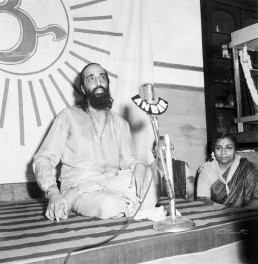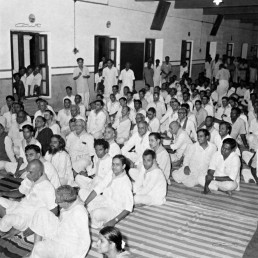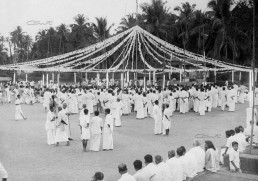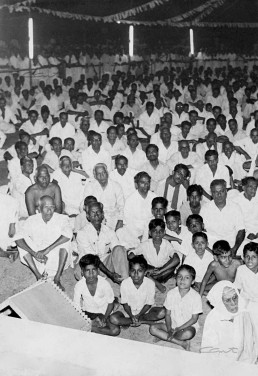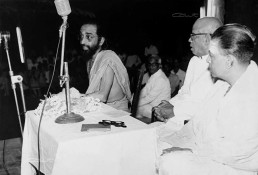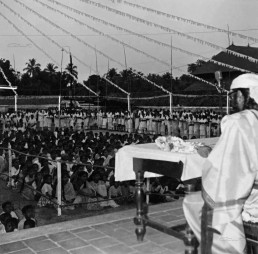
Jnana Yajna 78

Year & Dates:
January 03, 1961 to January 13, 1961

Yajna Topic:
Shrimad Bhagavad Gita- Chapter 12

Place:
Thalassery (Tellicherry), India.
An ancient trading center with a picturesque coastline, Thalassery, was in a jubilant spirit. At last, Pujya Gurudev was going to roar the message of scriptures in His 78th Jnana Yajna to the seekers in that town. The focus was going to be on Chapter 12 of Shrimad Bhagavad Gita, on the love for the Highest.
The Yajnashala: Outside the local temple for Lord Krishna, the yajnashala spruced with orange and white streamers stood ready for the happy audience. Pujya Gurudev was welcomed with flowers and lamps in a traditional, melodious style with naadasvara and caparisoned elephants leading the procession.
The Inauguration: Invoking Bhagavan Krishna’s Grace with prayers, the yajna commenced. Making the trip from Bengaluru in spite of health issues with great regard for Pujya Gurudev, Sri. V.P. Menon, a weathered statesman of Kerala, inaugurated the Gita Jnana Yajna.
The Gita Tune-Up for Higher Efficiency
From the Inaugural Message: Expressing how religion and faith in God build a strong society and enhance the welfare of a nation, Sri V.P. Menon stated that, “A man, or society without a
religion is like a horse without reins. In the Hindu tradition of thought, our Philosophy gives us not only an ideal and a perfect way of life but also prescribes the means and the method by
which individuals irrespective of their basic qualities can reach that state of perfect living. This is most important at the present time when there is so much misconception about Religion and its
moral values.”
Honored Attendee: On a nostalgic note, Sri Vishwanatha Iyer, the District Judge who presided over the yajna, recalled the vibrant, fun-loving youth of Pujya Gurudev. Knowing Pujya Gurudev from schooldays, He shared that even from that early age, the extraordinary brilliance in Pujya Gurudev’s eyes set Him apart from others. Pujya Gurudev being the pride of Kerala and a great champion of the Gita, it was an honor to preside over His first Gita Jnana Yajna at Thalassery, acknowledged the district judge.
From Pujya Gurudev’s Inaugural address: Pujya Gurudev first clarified that He had no mystic powers and was no divine messenger. He said unequivocally: ”We should not merely accept its (Gita’s) teachings simply because Lord Krishna is quoted as having said this and that. But we should merely treat it as the words of a Gopal or cowherd speaking to a frustrated and dilapidated prince Arjuna and seek to analyze the basic truths contained in it and study its pros and cons without any prejudice.”
“The lessons of the Gita bring home to us the relationship between the mind and body controlled by the intellect in the most efficient manner. The mind has to be tuned even as the engine of an automobile has to be for better efficiency and performance.”
The Audience: Impressed by Pujya Gurudev’s depth of knowledge and clarity of expression, the devoted audience of Thalassery listened with great faith. They understood that without decrying the distractions of the world, they could develop the ability to concentrate on the divine, as guided by Pujya Gurudev.
For Reflection: Through those crucial post-independence years in India, when Vedic scriptures were considered irrelevant to secular progress, Pujya Gurudev emphasized repeatedly that external progress is sustainable only with internal spiritual reconditioning.
Photo Gallery
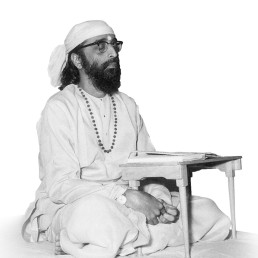
“Think,” Says Pujya Gurudev
“Free from dependence” (Anapekshah):- A true devotee no more depends upon either the objects of the world outside, or their pattern or their relationship with himself. An ordinary man discovers his peace and joy only in the world-of-objects available for him, their conditions and arrangements around him. When the right type of objects is in the right pattern courting him favorably, a man of the world feels he is temporarily thrilled and joyous. But a devotee is completely independent of the world outside and he draws his inspiration, equanimity and joyous ecstasy from a deeper source within himself.
“Who is pure” (Suci):- Dirt has no place anywhere within or without a true devotee. One who is aspiring to reach perfection will necessarily be so well-disciplined physically that he will be clean not only in his behavior but also in his relationship with others and even in the very condition and arrangement of his belongings around him. It is very well known that the condition of a man’s table or shelf and the cleanness of his apparel can give us a great insight into the mental nature, discipline and culture of that man. Great emphasis has been laid in India on this physical purity not only in the person of the man but his contacts in the world. Without external purity internal purification will become but a vague dream, an idle hope, a despairing vision.
From Tyagi Magazine
Don’t make this fundamental mistake!
Liberation from agitation stems from realizing joy resides within, not in external objects. This understanding eradicates attachment, envy, and fear, fostering a state of contentment and freedom from harmful desires. Not realizing this is the fundamental mistake we all make. A devotee, devoid of vasanas, finds joy within and is cherished for their inner peace and detachment.
